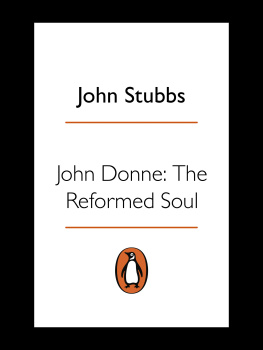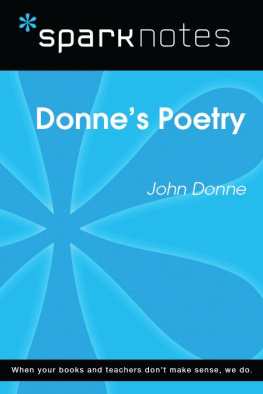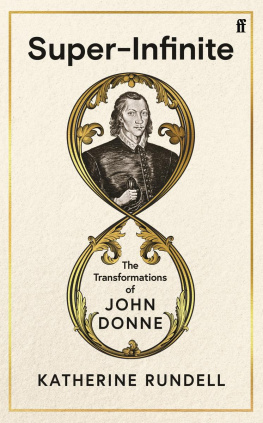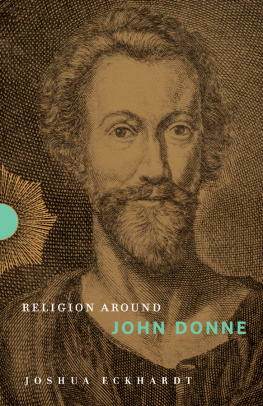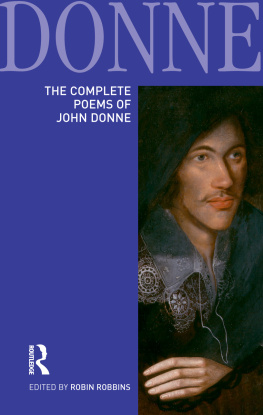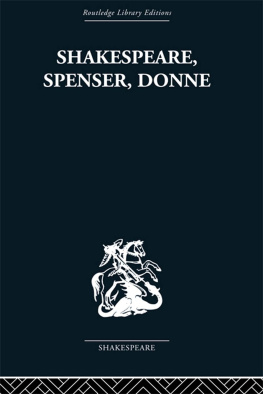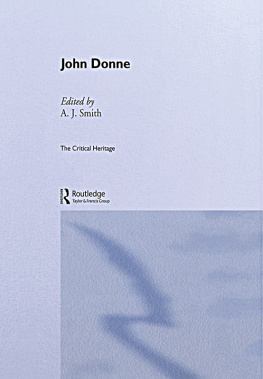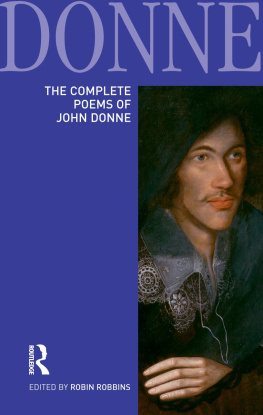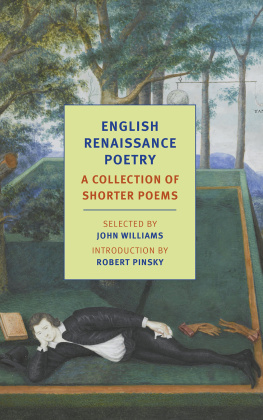John Donnes Performances
Sermons, poems, letters and Devotions
Margret Fetzer
Copyright Margret Fetzer 2010
The right of Margret Fetzer to be identified as the author of this
work has been asserted by her in accordance with the Copyright, Designs
and Patents Act 1988.
Published by Manchester University Press
Oxford Road, Manchester M13 9NR, UK
and Room 400, 175 Fifth Avenue, New York, NY 10010, USA
www.manchesteruniversitypress.co.uk
Distributed in the United States exclusively by
Palgrave Macmillan, 175 Fifth Avenue, New York,
NY 10010, USA
Distributed in Canada exclusively by
UBC Press, University of British Columbia, 2029 West Mall,
Vancouver, BC, Canada V6T 1Z2
British Library Cataloguing-in-Publication Data
A catalogue record for this book is available from the British Library
Library of Congress Cataloguing-in-Publication Data applied for
ISBN 978-0-7190-8344-0
First published 2010
The publisher has no responsibility for the persistence or accuracy of
URLs for any external or third-party internet websites referred to in
this book, and does not guarantee that any content on such websites is,
or will remain, accurate or appropriate.
Typeset
by Toppan Best-set Premedia Limited
Printed in Great Britain
by MPG Books Group, UK
For Severin
Contents
Acknowledgements
This book originated as a doctoral thesis at the Ludwig-Maximilians-University of Munich, Germany. During the years of writing my PhD, I have profited enormously from my supervisors insightful commentary and advice, and I would like to use this opportunity to thank Professor Tobias Dring for so thoroughly encouraging and supporting my work on Donne. I am also grateful to Professor Andreas Hfele and Professor Ina Schabert, both of whom were likewise involved in reviewing my thesis.
Parts of this study were presented at the universities of Munich, Tbingen, Berlin and Bonn, and I would like to thank the convenors of these conferences for giving me the chance to present my work in front of a larger academic audience. On these occasions and after, I have learnt much from such distinguished Donne critics as Professor Ramie Targoff, Professor Raymond J. Frontain, Professor Tom Healy, Professor Brian Cummings and Professor Wolfgang G. Mller.
Thanks go also to my colleagues and students at Munich, who contributed to the pleasant and inspiring working atmosphere at the department. In particular, I would like to mention Dr Daniella Jancs, who read an early draft of the project, and Kathleen Rabl, who proof read the final version of my PhD. Moreover, I would like to thank Manchester University Press for their friendliness and patience in answering all my questions concerning the publishing of this book.
Even though they may not at all times have known what exactly I was studying or working on, my parents, Dr Peter and Elisabeth Fetzer, have never hesitated to invest in my education. I would hereby like to acknowledge both their generosity and their patience in empathising with the developments of their daughters academic career. Moreover, I would like to thank my own daughter Magdalena for waiting to enter this world only two weeks after the manuscript of this book was sent to Manchester University Press.
This book would not have been completed without my husband Severins altogether non-academic support. Whenever I was overly preoccupied with my research, he managed to cheer me up and distract me for example by admonishing me to for Gods sake, hold my tongue, and let us love. It is to him that I dedicate John Donnes Performances.
Introduction Beginning Donne
Good wee must love, and must hate ill,
For ill is ill, and good good still,
But there are things indifferent,
Which wee may neither hate, nor love,
But one, and then another prove,
As wee shall finde our fancy bent.
(Communitie, ll. 16)
Since 1921, the year of T. S. Eliots review of Griersons Metaphysical Lyrics and Poems of the Seventeenth Century, John Donnes poetry has been of central interest for a large Communitie of critics. That Donnes writing is good and should thus be loved, has rarely been disputed when it was, as by Fish, others have been eager to counter charges of Donnes egocentricity by exposing the critics own self-centredness instead (Fish, 1999; Brett, 1999; Strier, 1995). The majority of the critical Communitie would however agree that not everything Donne wrote is deserving of the critics love. The poem under consideration, a rakish celebration of polygamy, is rarely included either in poetry anthologies or writing on Donne. In order to preserve the poets name, it has repeatedly been argued that Donne could not have been in earnest when composing poems like that quoted above (Guss, 1966; Zunder, 1982). The Donne canon has been sieved, but critics, of course, seized upon their own individual criteria as most adequate and determined selections as they found their fanc[ies] bent. What is true of literature studies generally is particularly striking in the case of Donne: the subjective preference of the critic surfaces in even the most perceptively argued accounts of his writing. What goes for Donnes work has even more relevance for his biography: more than is customary, his oeuvre has been scrutinised for traces of the writers precise religious allegiances and this holds not only for straightforwardly religious works, like the sermons or Devotions, but also for his divine and erotic poems (Martz, 1954; Lewalski, 1979; DiPasquale, 1999).
The present study is no exception. I, too, have shown a preference for some of Donnes poems over others, and, although my approach strives for greater comprehensiveness by focusing not only on Donnes Songs and Sonets but also on his divine poetry, as well as his sermons, letters and Devotions, one cannot presume this to be All Donne. My approach in the subsequent pages is to read Donnes texts as performances. I shall pay less attention to the underlying meaning of each text than to the ways in which Donnes writing performs, creates and communicates. The primary fancy of this book is bent less on estimating the conceptual content of some of Donnes writings than on concentrating on how what is said is articulated, transmitted, effected and received. Rather than speculate on his personal convictions, my thesis is that even Donnes apparently most contradictory utterances, whether in poetry or prose, whether concerned with erotic love or religious worship, are related to one another: each of them constitutes just one of John Donnes Performances.
Why performances?
In his 1955 lecture series How to Do Things with Words, the language philosopher J. L. Austin revealed that some utterances, instead of stating something, actually perform an act simply by being uttered (Austin, 1975). Moreover, they are not subject to truth-conditions, as they cannot be defined as either true or false. These so-called performatives include utterances made in marriage services or in christenings; thus an implicit link to (church) rituals is established. In the course of his lecture series, however, Austin gradually deconstructs many of the distinctions he drew initially: first the one between explicit and implicit performatives, and then the one between performatives and constatives, the latter term referring to utterances he originally judged to be concerned only with description and thus not performative in themselves.


